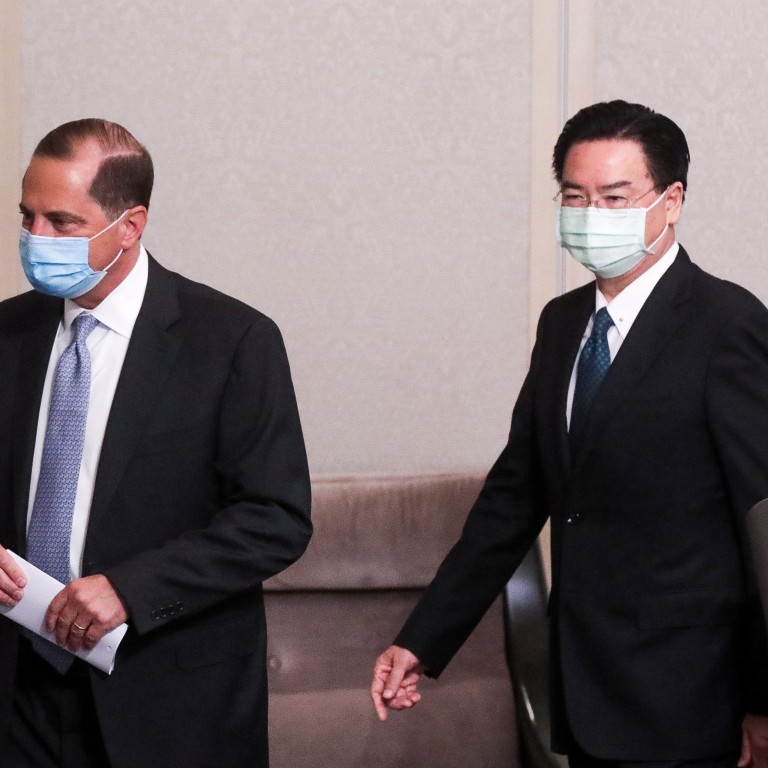
Taiwan takes aim at ‘Beijing’s suppression’, thanks ‘good friends like America’ during US health secretary talks
- Communist Party broke international health treaty by failing to warn the world about coronavirus, Alex Azar says during historic visit to island
- Azar expresses regret over Taiwan being excluded from the World Health Assembly and denied an opportunity to share its health expertise
“Taiwan is no stranger to such troubles. Our lives have become increasingly difficult as China continues to pressure Taiwan into accepting its political conditions, conditions that will turn Taiwan into the next Hong Kong,” Wu said.
Beijing considers Taiwan a breakaway province subject to eventual union with the mainland, by force if necessary. It has suspended official exchanges with Taipei, stepped up military intimidation and poached seven of the island’s allies since Tsai Ing-wen, of the independence-leaning Democratic Progressive Party was elected president in 2016 and refused to accept the one-China principle.
“We are fortunate to have good friends like the US and its enthusiastic members, like Secretary Azar, who were always there supporting each and every fight of Taiwan for international space,” Wu said, adding the US support was not just about Taiwan’s status, but about sustaining democracy in the face of authoritarian aggression.
“Taiwan must win these battles so democracy prevails.”
This is the start of a new cooperation, Tsai tells Azar on landmark visit
“In fact, the people of Taiwan are all too familiar with dealing with threats, be it military, diplomatic or the threat of epidemics. These are just parts of our daily adventures. Health officials in our Central Epidemic Command Centre, just like the commander-in-chief and our military officials, are always on high alert and stand ready 24-7 to defeat the enemy, visible or invisible,” Wu said.
He said the US support for Taiwan – a US partner in the free and open Indo-Pacific – was necessary to keep Taiwan from being suppressed by Beijing, adding that Azar’s visit was “indeed a powerful message to Taiwan”.
Washington switched diplomatic recognition to Beijing from Taipei in 1979, but has continued to maintain substantive relations with Taiwan in line with the Taiwan Relations Act, which commits the US to helping supply defensive weapons to Taiwan in the face of mainland military threats.
In response, Azar was careful in his speech, choosing not to say anything about the mainland, focusing mostly on Taiwan’s success in containing the pandemic and saying that Taiwan’s accomplishments should be recognised on the world stage.
He expressed regret over Taiwan being kept out from the World Health Assembly, saying he believed that if the island was included it should be able to “share these lessons and its world-class expertise in international forums”.
“I have made that point repeatedly at the World Health Organisation, from which Taiwan has been excluded as an observer for the last four years,” Azar said.
“ I have been a witness to the harmful and counterproductive results of excluding Taiwan from these international settings,” he said, citing Taiwan’s offer of US$1 million to help fight an Ebola outbreak in the Democratic Republic of the Congo in 2018, only to be rejected because of “the political bullying over Taiwan’s status at the World Health Organisation”.
He stressed during a pandemic, “international organisations should not be places to play politics”.
Beijing has time and again warned Washington against any form of formal interactions with Taiwan, with which it has suspended official exchanges since Tsai took office four years ago and refused to accept the one-China principle.
On Tuesday afternoon, Azar made a public speech at National Taiwan University, where he continued to praise Taiwan’s success in combating Covid-19.
But he used the opportunity to criticise Beijing for failing to open up when the outbreak first emerged.
“Taiwan’s approach to combating the virus through openness, transparency and cooperation stands in stark contrast to the country where the virus began,” Azar said. “The Chinese Communist Party had the chance to warn the world and work with the world on battling the virus. But they chose not to, and the costs of that choice mount higher every day.
“As the virus emerged, the People’s Republic of China did not live up to the binding obligations it had under the International Health Regulations [IHR], betraying the cooperative spirit we need for global health.” The IHR is an international legal instrument binding on 194 countries, including China.
Pompeo urges China’s citizens to help change Beijing’s ‘behaviour’
Azar also used his speech to offer the US’ condolences after the death this month of Taiwan’s former president Lee Teng-hui, to whom he was expected to pay tribute before winding up his four-day visit on Wednesday.
“The democratic legacy he built had made Taiwan a leader not only in economic growth but also in global health,” he said, referring to Lee’s leading role in introducing democracy to Taiwan.
Azar is the highest-ranking US official to visit Taiwan since 1979, a move that has sparked a strong protest from Beijing, which said President Donald Trump’s administration had violated the one-China policy.
In an interview on Monday with US channel Newsmax TV, Secretary of State Mike Pompeo said China’s anger over Azar’s visit only reflected its weakness.
“I think that tells you a lot about the weakness of the Chinese Communist Party and the fact that it could feel threatened from such a visit,” he said.
Azar also told CNN on Monday that his visit was “consistent with the United States’ long-standing one-China policy and past engagement with Taiwan”.

